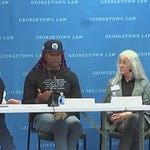*I was honored to join my longtime friend and brista in the movement for social, legal and racial justice, Cameron Clark, in this wonderful conversation. I hope you enjoy!*
Debt Free Justice is the national campaign to abolish fees and fines in the juvenile justice system. Coordinated by partners at the Juvenile Law Center (Nadia Mozaffar), the National Center for Youth Law (Miranda Sheffield), and the Policy Advocacy Clinic at UC Berkeley Law (Cameron Clark), and powered by grassroots advocates across the country, Debt Free Justice has pursued successful legislative advocacy in over 25 states since its launch in 2021.
For our this event, we are hoping to create a space for Black folks and allies to grapple with the present moment and begin the process of (re)charting our next steps. We have three Black panelists, all with relevant experiences navigating policy and organizing for Black liberation. While the conversation promises to be free-flowing, we would specifically ask that you share your perspectives on the historical significance of the times, roughly sketching the moral arc that the country/movement spans (and maybe which way it’s bending, and where we are on the arc).
Keywords
Black liberation, art, advocacy, youth rights, cultural moments, policy reform, representation, social justice, community, activism, Black liberation, systemic oppression, youth advocacy, interest convergence, reform, alternatives, radical imagination, community building, restorative justice, empowerment
Summary
The conversation explores the intersection of Black liberation, art, and policy reform, emphasizing the importance of cultural moments and the role of youth in advocacy. Panelists discuss how art serves as a powerful tool for expression and healing within the Black community, while also addressing the complexities of representation in positions of power. The dialogue highlights the need for critical engagement with policy reform and the challenges faced by young activists in navigating these spaces. This conversation delves into the complexities of Black liberation, exploring themes of empowerment through knowledge, the concept of interest convergence, the limitations of reform, and the importance of community building and restorative justice. The speakers emphasize the need for alternatives to current systems and envision a future rooted in radical imagination and collective action.
Takeaways
Art is a powerful tool for Black liberation.
Cultural moments can rejuvenate the movement for justice.
Youth play a crucial role in advocacy and art.
Representation in power does not guarantee justice.
Art can visualize experiences of oppression.
Policy reform must consider class and race dynamics.
Black faces in high places can be misleading.
Accountability is essential in leadership roles.
Art can immortalize Black experiences and voices.
The intersection of art and activism is vital for change. Systemic oppression controls youth in the Black community.
Knowledge and advocacy empower young people to create change.
Interest convergence is crucial for advancing Black liberation.
Reform is often insufficient; alternatives are necessary.
Imagining Black futures requires radical imagination.
Community building is essential for true liberation.
Restorative justice practices are vital for healing and progress.
Liberation cannot be achieved without addressing internal conflicts.
The current system limits our ability to envision a just future.
Change may not come in our lifetime, but the struggle continues.
Titles
Art and Black Liberation: A Conversation
The Role of Youth in Advocacy
Cultural Moments and Their Impact
Navigating Policy Reform for Black Futures
Representation vs. Reality in Leadership
Sound Bites
"Art allows us to visualize our experiences."
"Art is dangerous business."
"We must write louder than their silence."
"Art is a catalyst for immortalizing blackness."
"Representation matters, but is it genuine?"
"We have to get serious about accountability."
"Black faces in high places won't save us."
"We really had to do this on our own."
"We need to be looking at alternatives."
"Reform is not abolition."
"We must look to the past to go forward."
Chapters
00:00Introduction to Black Liberation and Art
03:01The Role of Art in Advocacy and Youth Rights
06:05Cultural Moments and Their Impact on Black Liberation
09:01Art as a Catalyst for Change
12:07Exploring Black Futures Through Art
15:10The Intersection of Policy and Black Liberation
17:56Black Faces in High Places: Representation vs. Reality
20:51The Challenges of Policy Reform and Youth Engagement
29:53Empowerment Through Knowledge and Advocacy
31:34Interest Convergence and Black Liberation
34:57The Limitations of Reform and Alternatives
38:16Imagining Black Futures and Radical Imagination
47:11Building Community for Liberation
52:26Restorative Justice as a Path to Liberation














Share this post